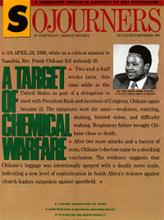It seemed too easy.
The world's most populous nation had given new meaning to the term "people power." For seven weeks, thousands of Chinese people, and on at least two occasions more than a million, marched and demonstrated nonviolently -- while hundreds of others fasted in Beijing's Tiananmen Square -- for political reforms. The world admired the dignity of the protesters and marveled at the restraint of China's political leadership. Could it be that China would follow the path of its communist counterparts in Eastern Europe and the Soviet Union, forsaking Mao's "barrel of the gun" philosophy?
The "Beijing massacre" on June 3 proved that possibility to be wishful thinking. Thousands of Chinese citizens, young and old, women and men, many of them students, gave their lives in the pursuit of democracy. They were either shot, beaten, bayoneted, or trampled to death by tanks of the People's Liberation Army. Afterward, scores of bodies were burned to prevent the full extent of the madness from being revealed.
Now they are martyrs.
Since the crackdown began, hundreds of "counterrevolutionaries, " "hooligans, " "thugs, " and "rumor-mongers" have been arrested, forced to undergo "ideological rectification." At this writing, several students and protest leaders have already been executed. China has not even acknowledged the international calls for clemency, and more executions will likely follow. Televised broadcasts showed people -- some who had obviously been beaten -- being arrested, recanting statements, and signing confessions, instilling enough fear into the Chinese people that not even a hint of underground protest has emerged since the crackdown.
Read the Full Article

